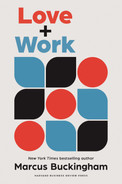
Can I Be the King?
Love has many signs, but the first of them—the first one to watch out for on your journey back to the heart of you—is instinct.
When you fall in love with someone, you can’t find the words to explain why. You meet them and can’t help but notice their black jeans, their unlaced shoes, how their bag seems to be falling off their shoulder as they walk yet never quite does. Your attention draws you in, and you notice more. The way they do silly dog voices, the way they hold their fork, the way they lower their lips to the cup as they drink, the way they always do what they say they will. All these things come together into a set of signals that this person is sending, and for some reason these signals jolt you. Every specific thing about them is heightened. And you’re in love.
“But why?” your friend asks you. “The unlaced boots, the fork, the bag, why do you respond to them the way you do? Why don’t they annoy you? Why do you even notice them at all?”
You can’t say. That you do is instinctive, but why you do is unexplainable.
This person happens to be sending out signals that you pick up on, and that resonate with you in a way that delights and intrigues you. Meeting them for the hundredth time feels like the first time. “I don’t know,” you confess to your friend. “It all just works for me.”
This same instinctive response occurs in the face of all moments, activities, and contexts in your life. Each activity, each interaction is emotionally charged, either positive or negative. Each moment hits you, you take it in, and it either lifts you up a little or drags you down a little. No moment leaves you at zero. It’s as if your life is sending you signals every day, and you’ve been wired to love some of these signals and to ignore, or even loathe, loads of others. As with romantic love, these signals that you love are instinctive, individual, and unexplainable.
You walk into a tile store, and it’s as if you’ve walked into a symphony. Every stone, every surface, every pattern seems to be calling out to you, asking you to delight in its fine shadings, its slight variations. It’s almost too loud for you, so many voices, so many possibilities, and you think to yourself, I’ve never seen so much variety in my entire life!
Then your sister taps you on the shoulder and says, “Look, we’ve got fifteen minutes in here. If you could just help me find something that’ll go with the sofa, then we’ll have plenty of time to hit Target and buy some trash cans.”
And you, well, you don’t quite know what to say. You’re in your own world. Instinctively, you find yourself wanting to stay all day. Whereas your sister’s instincts take you both out of the store as fast as possible. She can’t see what you see, or feel what you feel.
Or imagine another scenario: you’re in the office and you know, you just know, that you have to confront your colleague about what he said to your customer this morning. The meeting had ended quickly, and he’d rushed off somewhere, and so now you’re walking through the building trying to find him. “Come on,” says your teammate. “It’s getting late. Leave it till tomorrow. It can wait.”
But it can’t. Not in your world. What happened with your customer was wrong, and when you see something wrong, it gnaws at you until you confront the person and make it right. Some people shy away from tough conversations, but for you they aren’t tough. They are easy and straightforward, and getting them done energizes you.
Your teammate, confused and annoyed, leaves you as you instinctively go check just one more conference room.
One of the many things you will have to learn on your journey is that no one knows what your instincts are better than you. Someone else can tell you if they liked your tile choices, or if they felt you confronted your colleague effectively. But only you know which activities you’re instinctively drawn to, and which ones you aren’t. Your life keeps sending hundreds of thousands of signals your way—in the form of actions, people, situations—and you are the sole judge of which of these you can’t help but pick up on. You are the wisest person in your world.
Can I Be the King?
Ever since I can remember, I’ve instinctively volunteered to be onstage. The nativity play put on by our local church was so exciting because each year the neighborhood kids got to audition and then perform for seven whole nights and one matinee during Christmas week. My brother always got the angel Gabriel—those angels had great singing voices, so obviously Neil was a shoo-in. My sister, Pippa, was typecast as Mary—all grace and beauty, elegant arms rocking the baby Jesus ever so gently.
I didn’t have a guaranteed role, but I didn’t care. Each year I looked forward to the entire audition process, and would start prepping months before the date of the auditions was announced.
Which, in retrospect, is strange, since I never got the part I wanted.
One year I was angling for a king, didn’t mind which of the three. I got the apostle Peter instead. The next year, I pinned my hopes on Joseph. I got the donkey. My final year of trying out, inspired by Jesus Christ Superstar, I angled for the powerful but morally compromised role of Herod. I got Doubting Thomas. And when I complained that he wasn’t exactly central to the story, the powers that be relented and gave me Judas.
All the characters I went up for—although very different in their motivations and dramatic arcs—had one thing in common: they were all speaking parts.
And all the characters I was given had one thing in common: they were not speaking parts. The closest I ever got to a speaking role was Judas—I had to point my finger at Jesus and shout, “Him!” This was the highlight of my stage work.
And yet despite being disappointed year after year, I couldn’t help myself: winter would descend on our little village church and, instinctively, up would go my hand. This year, I told myself, this is the year I get some lines. And, of course, it wasn’t.
At the time, I thought the play’s organizers were just being mean—Can’t they just give me one little line? Now, looking back, I realize that they weren’t being mean at all: they were being protective. They were trying to save me from the embarrassment of being onstage in a speaking role … and not being able to speak.
You see, since my very first efforts to speak, I had failed to. I had a stutter, or a stammer, as we called it. Not one of those sweet little stutters that makes the listener lean in and smile, but one of those honking afflictions where the first letter of the first word dams the river of thought, bloats it into something large and loud and ugly, where the smile on the listener’s lips freezes first into incomprehension, then recognition that something is really wrong, until finally erupting into John Cleese–esque frustration: Oh, just please SPIT IT OUT!
On my first day of primary school, when every other kid was worrying about whether they would like their classmates, or make the soccer team, or like their teacher, I used the twelve minutes in the car to try to figure out how I would say my own name. I had spent my life devising tricks to get myself through a conversation: by the age of seven I’d worked out that, though l’s and m’s would always trip me up, c’s could sometimes be substituted by t’s, which for some reason were easier to say. And so “c-c-color” become a fluid “tolor,” “c-c-cars” sluiced out as “tars.”
Proper names, though, were the worst, and my name in particular. Marcus Buckingham, for a stutterer, is freakishly long, designed to stop fluency, dam everything up, leaving me hooked and thrashing on the long line of my own name. And unlike other tricky words that I could find a smoother substitute for, my own name could not be avoided, particularly on the first day of school.
I get out of the car, and Mom hands me off to the older lad welcoming us, who, in all innocence, asks my name. I freeze. “Marcus” becomes one long “Mmmmm,” and after about thirty seconds, I give up. Pretending it didn’t happen, we both walk quietly into the classroom. The teacher asks the older lad my name.
“I am not quite sure,” the lad replies. “He couldn’t say.”
“He didn’t say?” The teacher asks.
“No, he couldn’t say.”
The teacher looks at me with a confused half-smile and asks my name.
I, now surrounded by fellow students, face now matching my red jumper, try to blurt out “Buckingham,” but that too gets stuck and elongated in my throat, and my nickname—“B-b-b-BARKingham”—is coined on that very first day.
This stammer let me down. And others, too. Everyone could see it. Those nice church people were just trying to save me from myself. I kept raising my hand—couldn’t help it—and they thought to themselves, We know better. His instincts are off. He doesn’t really want to be stuck on a stage, stammering away. So, we’ll deflect. Let him audition, and then give him the donkey and Doubting Thomas. It’s the right thing to do.
Sweet as they were, they were wrong. They didn’t know better. It wasn’t the right thing to do. My instincts to get up on a stage and try to talk, those instincts turned out to be so prescient and wise that they defined, in the end, the entire course of my life.
The same will prove true for you. You will have some things that you instinctively yearn to do—before you’ve even tried them, you find your hand going up and your mind leaning in. These instincts are the first sign of love. And they have wisdom within them.
So ask yourself, “What do I find myself instinctively raising my hand for?” Left entirely to your own devices, which activities or situations seem to pull you toward them? Block out all the other voices and demands in your world, and see what your answers are. No matter the answers, they’ll be meaningful.
Honor yourself by listening to them.
